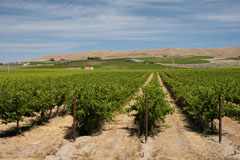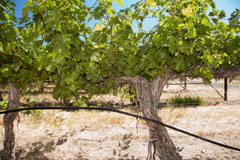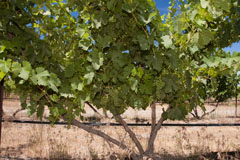Perfect Balance: Ciel du Cheval Vineyard
By Kori ~ March 14th, 2011.
Kori S. Voorhees, our Wine Peeps Editor-in-Chief, is also a regular contributor to Washington Tasting Room Magazine, a quarterly magazine that focuses on Washington State wine with articles about wineries, vineyards, travel, and lifestyle. The following article, written by Kori, appeared in the Fall 2010 issue.
 A source of elegant wines, grapes from Ciel du Cheval Vineyard are sought by winemakers for their ripeness, maturing, and perfect balance.
A source of elegant wines, grapes from Ciel du Cheval Vineyard are sought by winemakers for their ripeness, maturing, and perfect balance.
Attentive. Goal-oriented. Brilliant. Stable. Conscientious. Cutting-edge. These are qualities winemakers and winery owners use to describe Ciel du Cheval’s owner Jim Holmes and vineyard manager Ryan Johnson. Two of the hardest working and most well respected men in the Washington wine industry, their work ethic combined with Ciel du Cheval’s exceptional site make it a world-class vineyard.
“The character of the fruit, the quality of the fruit, the location itself, and the attention to detail by the growers is really a perfect mix of site and human influence,†says Bob Betz, owner and winemaker of Betz Family Winery. Ciel du Cheval is his single largest supplier of fruit.
Started in 1975 by friends of current owner Jim Holmes, Ciel du Cheval is located on Red Mountain just outside of Benton City, Washington. At the time, Jim Holmes and John Williams were business partners at Kiona Vineyards across the road.
In 1991, Kiona purchased Ciel du Cheval and when Holmes and Williams separated their business interests in 1994, Williams took the Kiona property and Holmes took Ciel du Cheval. Holmes made many improvements to the vineyard and hired Ryan Johnson as vineyard manager in 2000.
 Today, Ciel du Cheval has thirteen grape varieties planted on 120 acres, including Cabernet Sauvignon, Syrah, Merlot, Sangiovese, Cabernet Franc, Grenache, Mourvedre, Petit Verdot, Nebbiolo, Viognier, Roussanne, Counoise, and Pinot Gris.
Today, Ciel du Cheval has thirteen grape varieties planted on 120 acres, including Cabernet Sauvignon, Syrah, Merlot, Sangiovese, Cabernet Franc, Grenache, Mourvedre, Petit Verdot, Nebbiolo, Viognier, Roussanne, Counoise, and Pinot Gris.
Currently, about 30 producers purchase Ciel du Cheval grapes, including DeLille, Betz, Andrew Will, Mark Ryan, and Grand Rêve. When asked to characterize the overriding traits of Ciel fruit, Johnson, Betz, and Jay Soloff, co-owner of DeLille Cellars, all make mention of its ripeness, maturity, and balance.
Soloff, whose DeLille Cellars purchases about 30 percent of Ciel’s grapes, says, “When we bring in grapes from Ciel du Cheval, we know what kind of wine it’s going to make. We know that Jim has created for us grapes with flavor, grapes with not only maturity in the pulp but also maturity in the skin and skin tannins, balance with acidity and pH, everything perfect.â€
The original owners intended to pay homage to the Horse Heaven Hills, which can be seen from the vineyard, when they named Ciel du Cheval. “They had had some high school French and didn’t get it quite right,†recalls current owner Jim Holmes.
“Every Frenchman who comes by gives us a hard time about it. It kind of translates to ‘Horse Sky’, which doesn’t make any sense, but it was meant to be Horse Heaven.â€
No matter the origins of the name, having Ciel du Cheval on a bottle of wine is quite notable. Holmes keeps track of critics’ scores for wines made from his fruit for validation of what’s being done in the vineyard. “For our 2007 vintage, we have something like 50 wines that have been tasted and ratings published, and the average score across all of the wines and all of the wineries is 92 points.â€
 Ciel du Cheval utilizes different trellising systems, including fan-trained vines as well as the more common bilateral cordon. Fan-trained vines actually have four trunks and disperse the vigor throughout an eight-foot spacing instead of a four-foot spacing. Vineyard manager Ryan Johnson explains, “It catches the sun wonderfully; it’s kind of like a catcher’s mitt—great wind pass-through, great spray coverage, and a great natural shading.â€
Ciel du Cheval utilizes different trellising systems, including fan-trained vines as well as the more common bilateral cordon. Fan-trained vines actually have four trunks and disperse the vigor throughout an eight-foot spacing instead of a four-foot spacing. Vineyard manager Ryan Johnson explains, “It catches the sun wonderfully; it’s kind of like a catcher’s mitt—great wind pass-through, great spray coverage, and a great natural shading.â€
Some winemakers swear by the fan-trained vines while others prefer bilateral cordon. Holmes and Johnson work with each winemaker who purchases Ciel fruit to decide what’s best.
In addition, the newest vines at Ciel du Cheval are skewed in a diagonal orientation instead of just north/south or east/west so that they get equal heat units on each side of the vine.
At 120 acres, the vineyard is completely planted out, with the exception of a five-acre parcel in the middle of the vineyard reserved if they decide to open a winery someday, though there are no immediate plans to do so. Meanwhile, Holmes and Johnson continue to work hard to maintain Ciel du Cheval’s lofty status.
Johnson says, “It goes back to something that Jim Holmes told me on my first day on the job: ‘If you don’t stay cutting edge, someone else will pass you by.’ That’s our underlying philosophy out here.â€
Ciel du Cheval has three different soil types: Hezel sandy loam, Warden silt loam, and scooteney. Since Red Mountain is a desert, one extremely important tool in the Ciel du Cheval arsenal is irrigation management. They have moisture sensors located at one, two, and three feet deep, which provide them with constant updates on the moisture depletion.
 Holmes says, “We have forty different blocks out there (in the vineyard), and every morning I’m on my computer looking at the soil moisture profiles. I look at every block and evaluate it. Ryan is out there going up and down the rows.â€
Holmes says, “We have forty different blocks out there (in the vineyard), and every morning I’m on my computer looking at the soil moisture profiles. I look at every block and evaluate it. Ryan is out there going up and down the rows.â€
One of their most exciting projects is still in the development stages. The desert soils do not offer a lot of nutrition, there is little organic matter, and nitrogen levels are very low. In an effort to work away from using synthetic fertilizers to replace nitrogen, Holmes has partnered with Washington State University and Steven Link, a professional desert biologist, to develop a program to use native, nitrogen-fixing plants as a cover crop.
Bringing in synthetics and even the compost used by some vineyards can change the character of the soil, so Holmes’ goal is to sustain the unique terroir of Ciel du Cheval by using native plants instead. “We want to maintain our terroir as it was in the beginning because that is what defines us and makes us unique. We don’t want to change it, we just want to make it work in a natural way,†says Holmes.
Since the project started two years ago, they have completed a species-sorting part of the project and are currently developing a seed basis for these native plants, along with building their own nursery. The results so far have been promising, but there is quite a bit of research yet to be done.
Holmes and Johnson go above and beyond with hands-on farming practices, cutting edge technology, and excellent customer service to help their customers ultimately produce the best wine possible.
Bob Betz remembers, “One time I could not get over and it was very close to harvest. I had been over on Friday, and we weren’t going to make a decision until Wednesday on when to pick. Ryan picked clusters that morning, put them in a FedEx box, and overnighted them to me just so I could take a look. That’s the kind of communication and passion that they have for their site.â€
Ciel du Cheval delivers, in every sense of the word.
Filed under: American Wine, Vineyards, Washington State Wine, Washington Tasting Room Magazine, Wine Magazines

 Wine Peeps is an independent wine blog dedicated to helping you get the most bang for your buck in wine. We do this through blind tastings of wine from around the world and calculations of
Wine Peeps is an independent wine blog dedicated to helping you get the most bang for your buck in wine. We do this through blind tastings of wine from around the world and calculations of 











“Ciel du Cheval delivers, in every sense of the word.”
must be the poney express.
itsoffal,
Good one! Hahaha
Now I’m laughing cause you laughed.
take care.